 Rita Galkina
Rita Galkina Tini Tani
Tini Tani Kristin G
Kristin G Guiri Uribe
Guiri Uribe Robbie W
Robbie W
The increasing cost of materials hurts the development of manufacturing. Of course, shoes industry cannot avoid it, either. However, a large number of shoes enterprises in Wenzhou alleviate the pressure from increasing cost by purchasing materials all over the world.
At present, Wenzhou Jierda Shoes Co., Ltd bought some oxhide from abroad. According to its manager of foreign trade department, Mr. Mao Jiancheng, the raw materials for shoes surged last year. Take cow leather for example, its price increased 20%. This incredible growth of cost lays a heavy burden on enterprises. Fortunately, Jierda Shoes Co., Ltd got in touch with foreign suppliers early in 2008 and is approved to do processing trade. Now, 90% materials of Jierda are imported. India, Pakistan and South America are all its import bases.
According to officials of Wenzhou Customs, the way Jierda employed is called processing with imported materials, which is a way of processing trade. What's more, there are 306 companies employing processing trade this year. Over 30 are shoes companies. It becomes very popular among Wenzhou shoes enterprises to purchase oxhide all over the world.
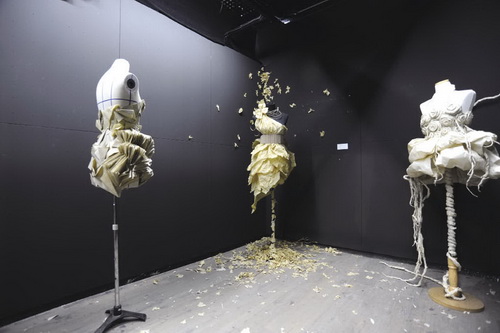
Recently, a special fashion art exhibition was staged in China Central Academy of Fine Arts. The specialty of this exhibition is that creations displayed are all made of paper.
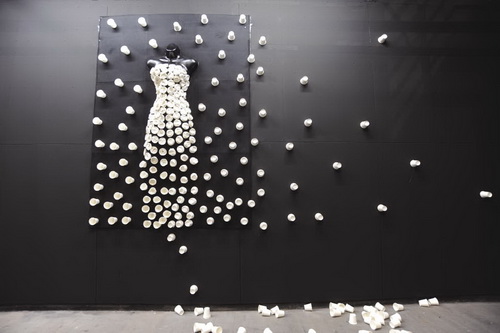
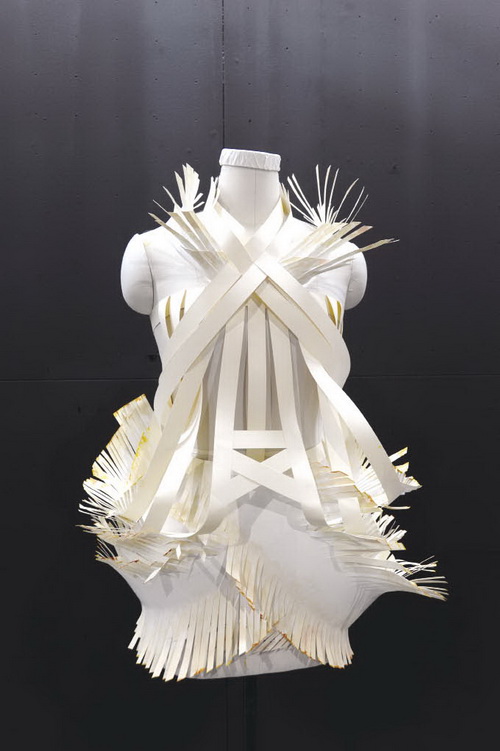
Designers of these creations are students from China Central Academy of Fine Arts, Hong Kong Polytechnic University and Hong Kong Design Institution.
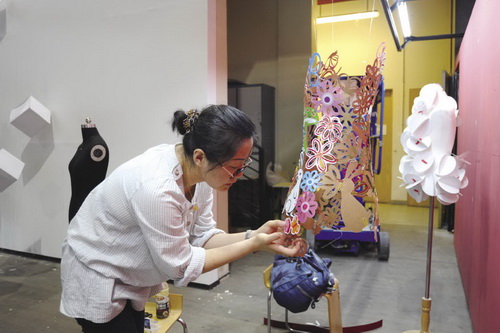
During these four days courses, doctor and professor Kim Chul Ho, professor Xu Ping and professor Lv Yue delivered speeches about the creative thinking and expression of Fashion Art. These four days courses and the exhibition are a part of communication program of fashion department of China Central Academy of Fine Arts.
It is known that these creations will be displayed in Hong Kong Polytechnic University in August.
According to Ha'erbin Customs, 1300 million shoes were exported in the first half year of 2010, increasing 60.8% compared to the same period last year. The export value reached 3800 million US dollars. The average price per pairs was 5.2 US dollars, decreasing 21.3%.
Experts said that the current global financial market was still turbulent and the recovery of world economy remained sluggish. Although the export tax rebate has been raised twice, the future of shoes export is not optimistic with the increasing trade protectionism, rising costs and the strong expectation of appreciation of RMB.
Experts advised that the shoes industry in Hei Longjiang should continue to adjust its industry structure so as to improve the quality and speed the upgrade of the industry. What's more, the Russian market share can be strengthened with products of good quality. Shoes enterprises should be encouraged to invest in Russian Industry Development Zones. As a result, the export pressure can be alleviated. Enterprises should also pay attention to the influence brought by appreciation of RMB.
Business Exchange Twitter Delicious Digg Facebook LinkedIn Newsvine Propeller Yahoo! Buzz Print Argentina closed probes and set anti-dumping levies on some Chinese products one week after the presidents of the two countries failed to end an embargo by the Asian nation on Argentine soybean oil imports.
Argentina will charge a 203 percent levy on a number of kitchen appliances from China and a $17.60 per kilogram levy on certain textile products containing more than 85 percent polyester. The end of investigations into textiles and kitchen appliances, which started in early 2009, was announced today in Argentina??s official gazette.
China in April banned Argentine soybean oil imports in retaliation for anti-dumping probes on products ranging from elevators to textiles. Argentina is the world??s largest exporter of soy oil. Until the start of the embargo, the South American nation supplied about 75 percent of imports by the Asian country, the world??s biggest consumer of the edible oil.
President Cristina Fernandez de Kirchner failed to have the ban lifted during a visit to China last week, when she met President Hu Jintao. The two countries agreed to form a commission to look into the matter.
Sales of the oil to China generate an estimated $600 million per year of export tariffs and tax revenue for the Argentine government.
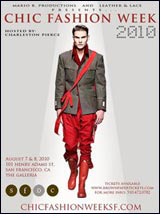 After two years of silence, a week devoted to fashion in San Francisco has finally returned, representing a reincarnation of local fashion as a collective whole. San Francisco Chic Fashion Week (CFW) will feature a week of fashion focused events culminating in a two day runway show in the Galleria at the San Francisco Design Center.
After two years of silence, a week devoted to fashion in San Francisco has finally returned, representing a reincarnation of local fashion as a collective whole. San Francisco Chic Fashion Week (CFW) will feature a week of fashion focused events culminating in a two day runway show in the Galleria at the San Francisco Design Center.
With weekday events located at some of the most fashion appropriate and well-known venues in the city, San Francisco Chic Fashion Week will successfully convey the spirit of San Francisco style and the designers that represent the community’s unique flare. The creative minds and unique visions behind San Francisco’s fashion industry will produce a stunning visual blend on the runway and represent a long awaited missing piece to both indie and commercial markets at large.
The event will bring thousands of fashion enthused patrons to San Francisco’s designer base. The fashion week will highlight 24 of the Bay Area’s most talented designers of which include Invisible Hero Industries, Danielle Pettee, Tosca Soroya, Magdalena May Trever and many more.
The week, organized by Leather + Lace Events and Mario B Productions, takes place from August 1th - 8th in San Francisco. Hosted by Charleston Pierce and with the support of many well respected industry professionals including Trevor Hewitt of Mixed Elements, Damien Miller of Sapient Photography and DJ Mei Lewn, Chic Fashion Week promises to be success.
The revival of Fashion Week will help raise awareness about HIV/AIDS through its main benefactor, Until There’s A Cure Foundation. Until There’s A Cure is a national nonprofit organization dedicated to eradicating HIV/AIDS by raising awareness and funds to combat this pandemic. Chic Fashion Week is also working with The House of Mario B, a non-profit organization which focuses on inner city high risk which introduces portfolio and confidence building skills. A portion of all proceeds will be donated to these organizations to help aid their causes.
 The Levi's brand announced the winner from their search for the first-ever Levi's Girl. Meghan Smith, a Charleston, South Carolina native currently living in Brooklyn, New York, will be the new face and voice for Levi's women in the digital space.
The Levi's brand announced the winner from their search for the first-ever Levi's Girl. Meghan Smith, a Charleston, South Carolina native currently living in Brooklyn, New York, will be the new face and voice for Levi's women in the digital space.
Meghan created a two minute video submission via the Levi's Girl Facebook application showing off her unique style and personality to land a six-month paid position in the Levi's marketing department.
"We're so excited to have Meghan infuse a female voice and perspective as the newest member of our online community," said Kristin Bannister, Levi's Director of Women's & Digital Marketing. "Meghan's self-proclaimed passion for 'living, being and doing,' along with her keen sense of style, truly captures the female essence of the Levi's brand and quickly made her a fan favorite among our online community members. We're thrilled to have Meghan work alongside our Levi's Guy, Gareth, as we continue to deepen our engagement with consumers in the social media and digital space."
In her new role as Levi's Girl, Meghan will be immersed in the Levi's business with a focus on social media efforts and engagement and communication with the Levi's female fan base. Meghan will also serve as the Style Ambassador for Levi's Women, posting inspiring looks and designs, and channeling her ideas, outlook and discoveries to millions of people around the world. Meghan will have an active involvement in the community by covering news and live events for the brand. She will be relocated by the Levi's brand this August to work at the company's headquarters in San Francisco.
"I can't think of a more perfect opportunity for me at this time in my life and am so thankful to have the chance to be a part of a brand that I have loved and admired for years," said Smith. "I look forward to working with the Levi's team and sharing my experiences with women all over the world."
The leather industry is seeking government assistance to help it tide over the European crisis fearing a downturn in growth in the second half of the financial year.
The European crisis will hit the leather industry as 65 percent export transactions are in euro and 10 per cent in pounds, according to Habib Hussain, chairman of Council for Leather Exports (CLE).
Although there has been a remarkable turnaround with a growth of 25 per cent in different segments in the first four months, the downside in the market is heavily dependent on euro (75 per cent of our trade is euro-centric), Hussain said.
"There has been a tremendous growth in the last four months. We expect a very good first half but the bottom-line is expected to be rough," he said.
"We urge the government to handhold us during this period", he added.
Highlighting the volatility in currencies that is affecting the business, he said, "You bid for a contract quoting the prices.
But the signing of contract only takes place after four to six weeks once you get the order and by then the currencies fluctuate."
"A month ago China allowed its currency to fluctuate but it was in decimals where as rupee fluctuates in digits, which is a cause of concern," he added.
"Now most of the industries have got order from abroad. With the crisis staring at us it looks like the more you produce the more you lose," he said.
"The irony is while the world leather industry is looking at India as an alternative to China, we are hit by the European financial crisis which is not a healthy sign for industry," Hussain added.
He said though India is the second largest producer of footwear and leather garments in the world, it accounts for a mere three per cent in the global leather import of $137 billion.
Hussain stressed on the need for infrastructure as well as skilled workforce to develop it.
However, the leather industry is still optimistic about the growth.
It has set up a target to increase the export from $3.59 billion during 2008-09 to $7.03 billion during 201314.
The domestic market for leather is also expected to grow significantly in the future.
Supermodel Naomi Campbell's testimony about a "blood diamond" in the war crimes trial of ex- Liberian leader Charles Taylor has been postponed until August 5 at her request, a court spokesman said Monday.
Prosecutors want Campbell to testify over a diamond they allege former president Taylor gave her. She was due to appear in court on July 29, but asked for a later date.
A spokesman for the war crimes court said Monday judges had approved the request, adding that Campbell was now scheduled to give testimony on August 5.
The prosecution has said Campbell could provide material evidence to rebut Taylor's claims that he never possessed rough diamonds. They accuse Taylor of taking diamonds to South Africa to buy weapons, which he denies.
In January, prosecutors said that during a visit to South Africa in 1997, Taylor gave Campbell a large rough cut diamond after a dinner hosted by Nelson Mandela.
A spokeswoman for Campbell has said that Campbell was a witness who had only been asked to help clarify events, and is not accused of any wrongdoing.
On trial in The Hague, Taylor denies all 11 charges of instigating murder, rape, mutilation, sexual slavery and conscription of child soldiers during wars in Liberia and Sierra Leone in which more than 250,000 people were killed.
China Linen Textile Industry, Ltd. (OTC Bulletin Board: CTXIF) ("China Linen" or the "Company"), a China-based company engaged in the production and sale of linen yarn and various types of linen fabric, today announced that it has expanded its linen yarn production capacity and added the capability to bleach linen fabric by entering into a Fixed Asset Lease Agreement with Lanxi Tianqianfang Linen Co., Ltd. (the "Lessor").
We believe the leased facility, which includes a building with an area of 23,358 square feet, a spinning production line with 3,000 spindles, bleaching machines and other equipment, will increase the Company's annual capacity by approximately 620 tons of linen yarn, or 39%, and 2.1 million meters of linen fabric, or about 26%, which is expected to add approximately $4.9 million in revenue, $1.5 million in gross profit and $1.2 million in net income over the next twelve months. The bleaching factory, with annual capacity to bleach 10 million meters of linen fabric, is expected to generate approximately $1.5 million in additional net income over the next twelve months. China Linen has commenced operation at the leased facility and expects to generate approximately $1.4 million in net income in the second half of 2010 from its new facility.
"We are pleased to sign this lease agreement which enables us to address our short-term capacity constraints while providing an option to acquire the facility," stated Mr. Gao Ren, chairman and president of China Linen. "We have seen an increase in demand from domestic and international customers this year, and this lease agreement enables us to fulfill more of those orders and improve our 2010 financial performance. In addition, we believe the bleaching facility will add a downstream vertical component to our value chain and further increase our gross margin. We plan to pursue more orders with the goal of full utilization of the leased facility and increasing our profit further for 2010 and 2011."
The lease term is for a period of twelve months, which commenced on July 1, 2010. China Linen intends to acquire all of the equity of the Lessor at some future date pursuant to a non-binding Company Acquisition Intent Agreement entered into between China Linen and the Lessor on April 26, 2010. In the event the Lessor arranges to transfer or sell the Facility to a third party during the term, or within the six-month period following the term, China Linen will have a right of first refusal to enter into such arrangements to acquire the facility under the same terms and conditions as were negotiated by the third party.
Hong Kong and China have signed the seventh CEPA agreement "China and Hong Kong Closer Economic Partnership Arrangement", but the agreement's implementation has met many problems, Vice Minister of China Commerce of Ministry Jiang Zengwei expressed when he met the delegation of Hong Kong manufacturers in Beijing, the implementation of CEPA, has not achieved ideal effect, especially in services trade, he promised that the Ministry of Commerce would arrange the implementation of CEPA as a priority in next two years, he encouraged Hong Kong businessmen to enter red wine market in mainland China.
Jiang Zengwei also said that Chinese mainland authorities would make further study as how to support Hong Kong's textile industry.
Jiang Zengwei pointed out that China has become high-end consumer market and low-end consumer market, while mid-end market is still blank, Hong Kong businessmen will have great opportunities in developing mid-end market.
In addition, Hong Kong and mainland China can even open up international markets such as Africa through cooperation by using China's goods, finance and technologies, plus Hong Kong's network and influence in international market.